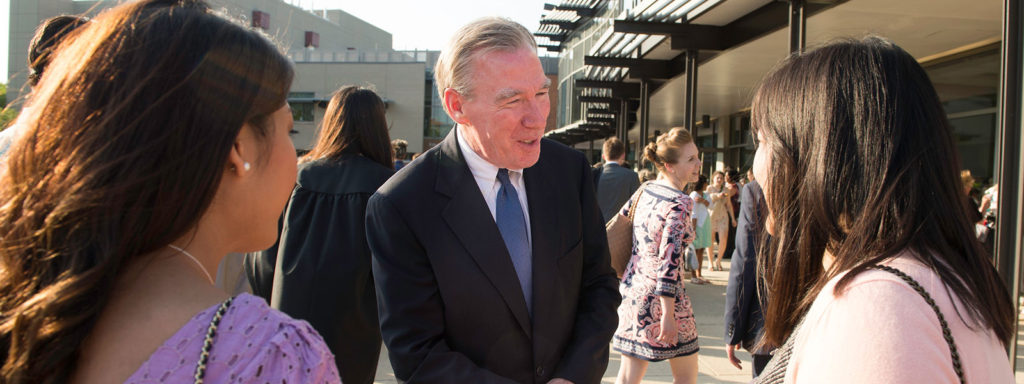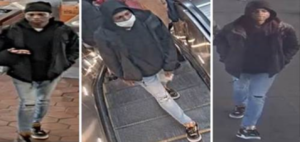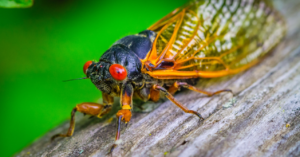SGA Virtual Town Hall with President Garvey Addresses Concerns of Class of 2021

Image Courtesy of Catholic University
By Jessica Fetrow
The Catholic University Student Government Association (SGA), in collaboration with university President John Garvey, hosted a virtual Town Hall meeting to “field questions, address concerns, and listen to ideas” presented by the class of 2021 on September 30 from 7 p.m. to 8:30 p.m. The Town Hall, held via Zoom webinar, was jointly hosted by SGA President Gerald Sharpe and President Garvey and featured contributions from Associate Vice President for Student Engagement Kathryn Jennings, Vice President for Student Affairs Judi Briggs Garbuio, and Director of Campus Activities Steve Kreider.
Although members of the senior class were encouraged to submit their questions for President Garvey in advance through a Google Form sheet available on The Nest and SGA Instagram account, participants were also able to submit questions live through the Q&A feature, as well as the “raise hand” feature to speak to Sharpe and Garvey directly. The subject of questions submitted ranged far and wide, but focused primarily on the logistics of the decision to withhold seniors from attending classes and living on campus during the fall 2020 semester, as well as what the future holds for the senior class during the upcoming spring 2021 semester.
The first question of the night centered around the decision to not allow upperclassmen to return to campus and the prioritization of the freshmen class over the senior class in light of the coronavirus pandemic, which President Garvey likened to the choice of the titular character of William Styron’s Sophie’s Choice.
“We brought in all of the people concerned from student affairs and talked it over with people across the university faculty and staff,” Garvey said. “[We decided that] the freshmen were most in need of our care and concern because they were being away from home for the first time and just launching at the university. Their hold on what we were offering here was so tenuous that we felt we needed to orient them to the university in person, to show them around, and teach them where the campus was, how to get to their classes, and so on.”
Garvey also remarked on the cooperation of freshmen with guidelines and restrictions implemented on campus this fall.
“We’ve had more cases off campus than on, so in a sense the safest place to be is on campus because we are taking such care with wearing face masks and maintaining social distancing in classes,” Garvey said. “The freshmen have been cooperating to a remarkable degree.”
Soon after, President Garvey was asked whether or not the senior class would receive prioritization next semester when deciding what students would be allowed to return to campus.
“I get asked this question a lot and I always say ‘yes,’” Garvey said. “People will ask me how I can be so optimistic that we’re going to be able to open and I say I’m not optimistic, I’m resolute. I’m just determined that we should be able to open in the spring. If we are, and I am determined that we will be able to, I think we would give the seniors priority because of how bad I felt about last year’s seniors.”
Garvey also stated that “the most important element in making that happen is success in what we’re doing now. Slowing the spread on campus, keeping a respectable distance [from others], wearing personal protective equipment, and so on.”
President Garvey broke down three important aspects of reopening campus in the spring to upperclassmen; these include how to make on-campus residence halls, which are currently hosting between six and seven hundred students, “safe” and “manageable,” how many classes are able to be taught by faculty that are comfortable returning to campus, and whether or not there are currently enough locations on campus to teach from if class sizes are reduced to 30% of their original capacities.
If upperclassmen are able to return to campus for in-person classes during the upcoming semester, individual students uncomfortable or unable to return to campus to complete their degree are expected to be able to complete their degree remotely, as of now.
Garvey also emphasized a strong desire to permit some form of Senior Week and commencement ceremony for the class of 2021, depending on government regulations.
“I feel about Senior Week and commencement the same way I feel about the spring semester,” Garvey said. “I’m determined that we should be able to do it.”
Garvey also touched on the ethical aspect of potential COVID-19 vaccines, some of which are being developed using cells from aborted fetuses, similar to pre-existing vaccines for diseases such as measles, rabies, chickenpox, and rubella. The Catholic Church has previously stated that vaccines with “moral problems” may be used on a temporary basis if it is in the best interest of the safety of popular health, as long as no other morally unproblematic alternatives are available.
President Garvey stated that he does not believe that the university would mandate that students returning to campus be required to receive a COVID-19 vaccination if the only available vaccine is produced with these cells.
“If there are five varieties of vaccines available and one of them is produced [with the cells of aborted fetuses], I think that we should all boycott that particular vaccine in order to discourage people from doing that,” said Garvey.
Several students utilized the Q&A and “raise hand” features of the Zoom webinar to ask questions directly to President Garvey.
Senior marketing major Hannah Cundey asked about the sudden change in communication between university administration and students when announcing an online semester for upperclassmen.
“I know myself and a lot of seniors were really paying attention to a lot of those [COVID-19] update emails that we were getting over the summer, and I’m just kind of curious as to why the plan of only offering one class wasn’t voiced as one of the plans,” Cundey said. “It just seemed that when that email came July 31, it was kind of a rough change from what we had been told all summer.”
Garvey attributed this abrupt change of plans to the sudden increase in COVID-19 positive cases and transmission rate in D.C in late-July, resulting in the university’s inability to safely relocate positive students to the previously designated residence halls within the first week of returning to campus. This ultimately led to the decision to reduce the number of students on campus.
Kreider also responded to a question submitted through the Q&A feature regarding whether or not upperclassmen are allowed to be on campus for student organization events.
“At this time, upperclassmen are allowed on campus for events, whether that is to host or attend events,” Kreider confirmed. “There are a number of restrictions within the university regarding space, what can be used, how many people in a space, things like that. But within those general guidelines, there are no longer restrictions regarding which students can and can’t be at an event.”
The Town Hall took an abrupt turn towards national politics in light of recent controversy stemming from the first presidential debate when an anonymous participant asked if Sharpe and Garvey would publically condemn white supremacy, to which each succinctly and firmly responded “yes” before continuing with the session.
President Garvey acknowledged the concern about the impact of self-isolation and financial constraints on mental health, and Dean Jennings responded to several Q&A submissions, informing contributors that coronavirus testing is available at the university’s coronavirus testing center.
President Garvey also addressed the financial consequences of the coronavirus on the university, asking for audience members to respect the sacrifices being made by faculty, staff, and administrators in order to compensate for lost income.
An anonymous audience member asked Garvey to expand on the jurisdiction of the university’s Department of Public Safety in regards to monitoring off-campus gatherings.
“The rate of infection among our students off campus has been much higher than the rate of infection among the students on campus,” Garvey said. “The city is going to be watching carefully to find what the rate of spread is among our students and this is going to have a bearing on their willingness to go along with whatever plans we might make for the spring. I think we all have an interest in minimizing our partying until we make a decision about that.”
The Town Hall is available to view in full on the SGA’s YouTube page.







